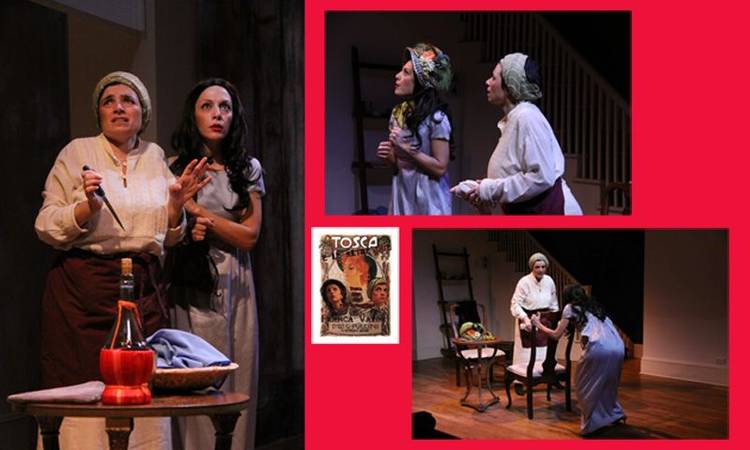


Tosca is an opera in three acts by Italian composer Giacomo Puccini... opera lovers are pretty familiar with its plot but everybody else should know that it is a melodramatic piece set in Rome in June 1800. It's the story of Floria Tosca, an admired opera singer, her lover, Mario Cavaradossi, a young and handsome artist, and Baron Scarpia, Rome's merciless Chief of Police. By the end of the opera, all three are dead.
Tosca is the backdrop for a sharp satire written by a great, contemporary Italian woman playwright, Franca Valeri, by the title Tosca e le Altre Due (Tosca and the Two Downstairs) that Laura Caparrotti's Kairos Italy Theater is bringing to Dicapo Opera. The production, directed by Laura Caparrotti, is running until March 30. The plot of Tosca runs simultaneously with Valeri's play, indeed the playwright was inspired by the storyline, the main characters and settings of all three acts of the opera to tell the story of two women, Emilia (Laura Caparrotti) and Iride (Marta Mondelli).
.
“Emilia and Iride are two commoners divided by their origins - the former is from Rome, the latter is from a small town in Lombardy, in the northern Italy - and by their different life choices,” Marta Mondelli explained when asked to talk about the characters, “Iride is an actress who has even worked the streets in order to make it, while Emilia has a more stable life and works as a porter at Palazzo Farnese. They're both married with children but their life is not really influenced by romanticism and love but rather by their work, their occupation is what defines their identity. Emilia is a rock, she's strong, frank, equipped with dry humor and curiosity... she is intrigued by Iride's unexpected arrival and at the end she reveals that underneath a seemingly hard surface there is a generous heart.
Iride, who appears to be a woman of the world, slowly reveals her true nature, that of a commoner who's unlucky in love. In a sense she lives the flip side of the coin which represents Tosca's life,a life of glamor, passion and success.”
As the two women are talking in the porter's lodge of Palazzo Farnese, Emilia's place of work, things are happening offstage: Scarpia's capture and torture of revolutionary Cavarodossi, and Scarpia's attempted sexual assault of Floria Tosca. Emilia and Iride refer to some of the opera's characters (Iride, for example, is married to Sciarrone one of Scarpia's henchmen) and we briefly hear Tosca singing and Cavaradossi scream as he is tortured, but apart from that this is their story. Author Valeri, uses wit and dark humor to provide a dissection of society, a picture of lower and upper class culture and of social injustice, a portrait of the suppression of women who are either sexual objects or housewives.
“Franca Valeri is one of the foundations of Italian theater,” Laura Caparrotti said, “She has been the first woman to make a name for herself in a world that was male dominated. In the 1950s when she started to become famous for her satirical portraits of women, that she both wrote and acted in, women in the show business were only pretty actresses, never playwrights, comedians, opera experts or directors. Also, they never were completely independent. She is the mother, or in some cases, the grandmother of all the female comedians, playwrights and artists that feel they don’t have to be a pretty face to make it. Not only that. Franca is a brilliant mind also when it comes to everyday life and its issues. In 1962 she wrote the subject of a film, Parigi o Cara, where she talked about being gay in a society where being gay was not admitted. This is how she became a gay icon in Italy. Last but not least, Franca is an example for all of us. She is going to be 94 in July and she just announced that she is going to open with a new show – written by her - at the Spoleto Festival. How amazing is that?”
The play is acted in Italian but provides a translation into English, executed by me, Natasha Lardera. The two characters speak two different dialects and at times make some mistakes, so the translation tries to be as faithful to the original as possible.
“I have decided to do in Italian because the language of Franca Valeri is too wonderful and we wanted to have fun with the original text while having supertitles like they do at the Opera. The play is a play-within-the Opera so it works perfectly,” Laura Caparrotti explained, “For this production, the supertitles have been finalized by Prescott Studio, one of the most important studios for supertitles in the world. The idea is to do it in English sooner or later. We have just to find the best way to have Emilia and Iride speak in another language.”
Tosca e le Altre Due (Tosca and the Two Downstairs) March 20 to March 30 Dicapo Opera, 184 E 76th Street, Manhattan (between Third Ave. and Lexington) Presented by Kairos Italy Theater www.kittheater.com [2] and Dicapo Opera www.dicapo.com [3] Thursdays through Saturdays at 8:00 pm, Sundays at 2:00 pm $35.00 general admission; Box Office (212) 868-4444, www.smarttix.com [4]
Source URL: http://test.casaitaliananyu.org/magazine/events/reports/article/theater-franca-valeri-tosca-and-two-downstairs
Links
[1] http://test.casaitaliananyu.org/files/37693toscacaparrotti1395802454jpg
[2] http://www.kittheater.com
[3] http://www.dicapo.com
[4] http://www.smarttix.com